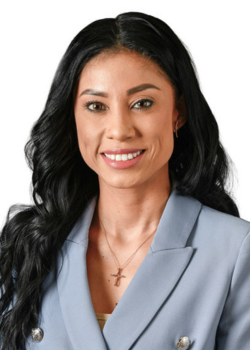Expert tips to jump-start your dental assisting career

Whether you’re new to dental assisting and looking for your first job, or you’re experienced and want to pivot or advance, it can be daunting to know where to start with job searching and interviewing.
As PDS Health’s Director of School Relations and Dental Assistant Programs, Rose Olague, RDA, brings a unique perspective to her role, where she supports more than 6,000 dental assistants in 24 states in starting and growing their careers.
That’s because Olague is a dental assistant herself — and has been for more than 15 years. She’s worked for PDS Health, the dental support organization formerly known as Pacific Dental Services, since graduating from a high school program and completing an externship with the company. Now, she says, “I am very proud to help every dental assistant achieve their definition of success.”
Olague continues to work chairside as a registered dental assistant in Southern California, plus she mentors recipients of the Dr. Carolyn Ghazal Dental Assistant Scholarship through the PDS Health Foundation. As an expert in the field, she’s also served on the Dental Board of California since her governor appointment in April 2018. “I now have a voice for our 6,000-plus dental assistants and the future of the dental assistant role in healthcare,” says Olague, who is pursuing a Ph.D. in organizational leadership.
With a wealth of education and experience, and a passion for “all things dental assisting,” Olague has expert-level advice for dental assistants at all stages about how to jump-start their careers.
Finding job opportunities for dental assistants
It can be challenging to know where to seek job opportunities. Luckily, many dental assistant job openings can be found at your fingertips, online.
The Dental Assisting National Board has a job board where dental assistants can see what’s available in their area. Additionally, social media can be a great place to look for roles.
 “Leverage your network, including consulting with colleagues, classmates, and teachers about opportunities they may know about. You never know who knows someone else who can help connect you with your professional home for the next, let’s say, 15-plus years.” — Rose Olague
“Leverage your network, including consulting with colleagues, classmates, and teachers about opportunities they may know about. You never know who knows someone else who can help connect you with your professional home for the next, let’s say, 15-plus years.” — Rose Olague
“Look at LinkedIn, look at Facebook, look at Instagram, and go directly to the employer’s website,” advises Olague, who notes PDS Health has many opportunities for job-seeking dental assistants. “At PDS Health, we offer dental assistant training, as well as our lead dental assistant program, which allows dental assistants to have a career path here. We help them get the credentials and certifications they need to be successful in a career in healthcare. And through the PDS Health College Advancement Program, every dental assistant has the opportunity to attend a four-year university and pursue an undergraduate degree at zero cost.”
For both established and aspiring dental assistants, word of mouth also can go a long way. “Leverage your network, including consulting with colleagues, classmates, and teachers about opportunities they may know about,” Olague says. “You never know who knows someone else who can help connect you with your professional home for the next, let’s say, 15-plus years.”
Preparing for your dental assistant interview
If you’ve applied for a dental assistant role and heard from the hiring manager about scheduling an interview, this undoubtedly feels exciting — and perhaps overwhelming. How can you ensure the interview goes well when the time comes to make a positive impression?
According to Olague, a successful “talent assessment,” or interview, starts before it even begins — by doing your homework. You’ll want to find out answers to the following questions.
- What’s the employer’s reputation? Olague suggests searching for the employer online to determine if the office would be a great place to work. “Look at their Google reviews and social media channels, such as Instagram and LinkedIn. Look them up on the dental board website. It’s important to know who they are in the community and whether these are the people you want to work alongside chairside every day.”
- What’s the the salary range for the role? To determine if your desired salary is in the typical range for the role and your area, you’ll want to research dental assistant salary. Olague recommends referencing reports such as DANB’s Dental Assistants Salary and Satisfaction Survey. “I use this survey report to educate dental assistants or hiring managers about the current market.”
Olague also suggests looking at total compensation, including common benefits for dental assistants such as paid time off and holidays, a retirement savings plan, and health insurance. It’s also important to consider opportunities for growth. For example, does the employer support dental assistants in taking DANB exams and becoming certified? During a salary negotiation, mention you’d like to be as close to the top of the range as possible, and be prepared to speak to your education and experience to demonstrate the value you would bring.
- What interview questions can you anticipate? The best prepared job applicants have reviewed the job description and their state’s requirements, looked up common interview questions for dental assistants, and then practiced in a mock interview. “Partner with a colleague or mentor to practice answering questions you might be asked during the talent-assessment process,” Olague says.
Before the interview, consider clarifying the logistics of the interview with the hiring manager.
- When and where will the interview be? Plan to arrive early and map out the route to the office ahead of time. Punctuality sets a positive tone for the rest of the interview.
- What’s the dress code? What should you wear to a dental assistant job interview? “Dress code is something I often get asked about in the talent-assessment process,” Olague says. “‘Is it appropriate to show up in scrubs?’ ‘Is business attire preferred?’ Always ask.”
- Will this be a working interview? You may need to demonstrate your skills during the interview. “Working interviews are not currently part of our talent-assessment process, but many practices and clinicians still prefer them,” Olague notes. “It depends on who you’re interviewing with and their expectations.”
If you’re asked to do a working interview, you should be compensated. Talk with the hiring manager beforehand to confirm the hours, rate of pay, and payment method, and make sure you have all of this in writing.
Olague points out that this level of preparedness will show you’re interested in the employment opportunity and fully engaged in the process. “Having questions ready is a key component that I often look for,” she says. “I call it the ‘humble and hungry’ piece. Is the dental assistant willing to learn? Have they done their research, and are they eager to build a career here?”
Making a lasting impression during and after the interview
Once you’ve done your research and the interview day arrives, it’s time to focus on standing out from the other applicants. In addition to bringing several copies of your resume, bring your confidence, your positivity, and your professionalism. Remember: Employers are assessing more than your dental assisting skills and knowledge; they are also observing how you handle situations and interactions from start to finish.
“From the moment you park in that parking lot, it’s game time,” Olague explains. “You never know who may be watching. Be mindful as you walk into the practice and notice the patients coming in. Open the door for them. Greet the receptionist. Keep your cellphone put away while you’re waiting in the reception area.”
Olague believes that dental assistants are the “masters” in the art of first impressions. “Take that authentic, charismatic, genuine personality you have and bring it to that talent-assessment process,” she says.
Finally, expressing gratitude can help you end the interview experience on a positive note. “Write a thank-you note to anyone you interviewed with,” Olague advises. “Thank them for their time and the conversation, and let them know you’re looking forward to hearing from them.”
Even for the most qualified and best prepared applicant, the interview outcome may not always be what you hoped for. If you don’t hear back or receive a rejection, try to view it not as a failure but as a learning opportunity for next time.
“It’s a ‘no’ for that practice, not a ‘no’ to having a career in healthcare,” Olague reassures. “Take any feedback you receive, review your resume, reflect on the questions asked and your responses, and seek help and support from those already in the field.
“Remember, you never know what that next opportunity may be!”

